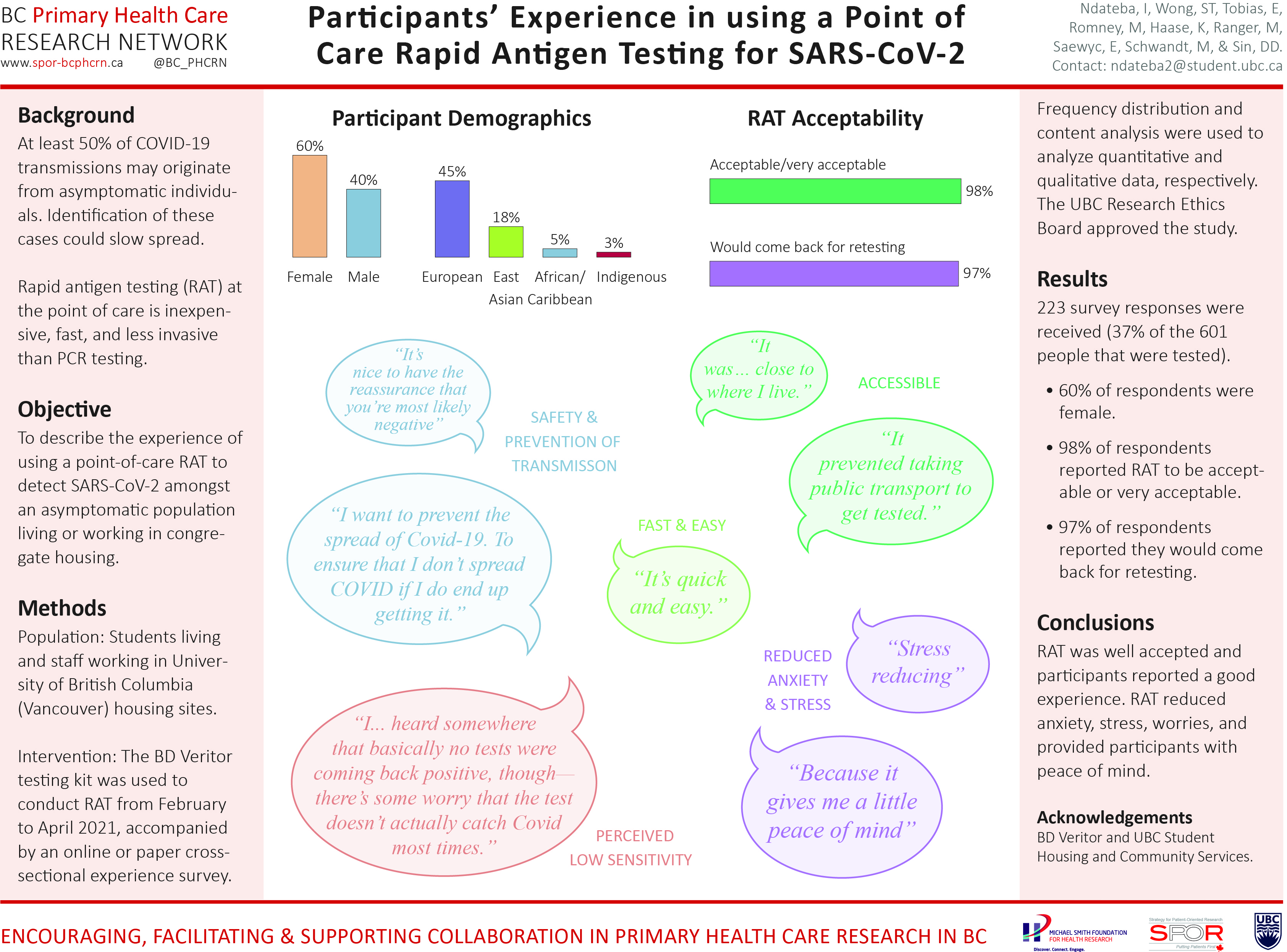SRFP074: Participants’ Experience in using a Point of Care Rapid Antigen Test (RAT) for SARS-CoV-2 (Pearls)
Innocent Ndateba, MN, MPH, RN; Michael Schwandt, MD, FRCPC, MPH; Elizabeth Saewyc, PhD, RN, FSAHM, FCAHS, FAAN, FCAN; Don Sin, MD, MPH; Erica Tobias, BSc, BSN, RN; Sabrina Wong, PhD, RN; kristen haase; Manon Ranger, PhD, RN
Abstract
Learning objectives:
On completion of this presentation, participant should be able to:
Understand the feasibility of RAT for SARS-CoV-2 screening in primary care
Understand the role of RAT for SARS-CoV-2 screening in prevention of COVID-19 transmission in community
Context: The COVID-19 pandemic has paralyzed human interactions worldwide. At least half of COVID-19 transmissions could originate from asymptomatic individuals. Rapid Antigen Testing (RAT) with nasal sampling at the point of care is inexpensive, fast and less invasive than PCR testing. Objective: The overall study objective was to examine the feasibility of point-of-care RAT for detecting SARS-CoV-2 amongst an asymptomatic population living in congregate housing. Design: Cross-sectional survey. Setting: This study was conducted at the University of British Columbia (UBC). Approximately 1500 undergraduate student were at the study site during February-April 2021. Population: Students living in UBC housing and staff working in the UBC housing sites were eligible. People testing positive for COVID-19 in the prior 90 days were excluded from the study. Intervention: The BD Veritor testing kit was used to test bilateral nasal specimens. Results were ready by the small BD Veritor reader. Outcome measures: Experiences of surveyed participants completing RAT. The survey was conducted during the last three weeks the site was open. Results: A total of 223 participants consisting of 134 (60%) females and 89 (40%) males completed the survey for a 37% response rate. Participants were mainly of European descent (45%), though there were East Asians (18%), African/ Caribbean (5%) and Indigenous (3%) people who also completed the survey. Almost all (98%) reported that RAT was acceptable/very acceptable and 97% would take another test. Participants believed they would test negative given their careful observation of public health measures such as hand washing, mask wearing and restricting contacts to their small “bubble”. Their expectation of testing negative was based on having no or minimal interactions with any person who had tested positive. More than two thirds of participants reported RAT provide them peace of mind and reduced anxiety levels. Participants found the RAT to be safe, easy, accessible and rapid. Conclusions: Rapid antigen testing for detecting COVID-19 is well accepted and could support the detection of infection at an early stage amongst asymptomatic individuals while easing their worries
On completion of this presentation, participant should be able to:
Understand the feasibility of RAT for SARS-CoV-2 screening in primary care
Understand the role of RAT for SARS-CoV-2 screening in prevention of COVID-19 transmission in community
Context: The COVID-19 pandemic has paralyzed human interactions worldwide. At least half of COVID-19 transmissions could originate from asymptomatic individuals. Rapid Antigen Testing (RAT) with nasal sampling at the point of care is inexpensive, fast and less invasive than PCR testing. Objective: The overall study objective was to examine the feasibility of point-of-care RAT for detecting SARS-CoV-2 amongst an asymptomatic population living in congregate housing. Design: Cross-sectional survey. Setting: This study was conducted at the University of British Columbia (UBC). Approximately 1500 undergraduate student were at the study site during February-April 2021. Population: Students living in UBC housing and staff working in the UBC housing sites were eligible. People testing positive for COVID-19 in the prior 90 days were excluded from the study. Intervention: The BD Veritor testing kit was used to test bilateral nasal specimens. Results were ready by the small BD Veritor reader. Outcome measures: Experiences of surveyed participants completing RAT. The survey was conducted during the last three weeks the site was open. Results: A total of 223 participants consisting of 134 (60%) females and 89 (40%) males completed the survey for a 37% response rate. Participants were mainly of European descent (45%), though there were East Asians (18%), African/ Caribbean (5%) and Indigenous (3%) people who also completed the survey. Almost all (98%) reported that RAT was acceptable/very acceptable and 97% would take another test. Participants believed they would test negative given their careful observation of public health measures such as hand washing, mask wearing and restricting contacts to their small “bubble”. Their expectation of testing negative was based on having no or minimal interactions with any person who had tested positive. More than two thirds of participants reported RAT provide them peace of mind and reduced anxiety levels. Participants found the RAT to be safe, easy, accessible and rapid. Conclusions: Rapid antigen testing for detecting COVID-19 is well accepted and could support the detection of infection at an early stage amongst asymptomatic individuals while easing their worries
